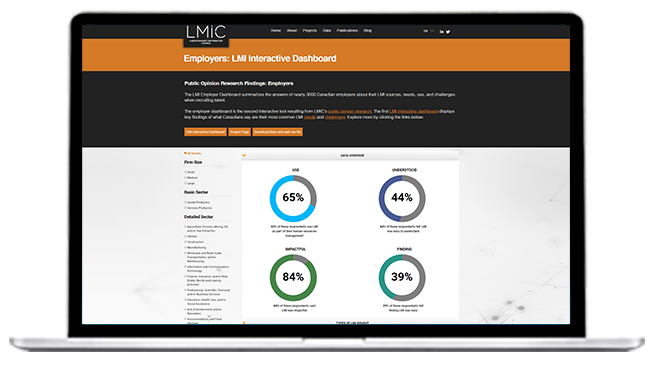
Reconciling LMI Needs of Workers and Employers
Shared Objectives
For nearly a decade before arriving at LMIC, I worked at the International Labour Organization (ILO). The ILO is a tripartite UN organization that brings together employers, workers, and governments. This tremendous forum enables different viewpoints of the labour market to come together, if not always in complete agreement.
However, as I have argued in a previous blog — Evidence-Based Policy Making is a Collaborative Endeavour — such open dialogue leads to better policy formulation and ultimately better outcomes. I also firmly believe that, underlying the often-divergent views of how to design policies, we share a core common goal of making sure our workers and businesses, as well as our society and its economy, reach their full potential.
Understanding the importance of various perspectives is something I carried over to LMIC, and it is really now part of our DNA. When we launched our first major project to understand the labour market information needs of Canadians, we focused our efforts on individuals (e.g., students and the unemployed) which you can access here, but also on the needs of employers. This latest wave of research results is now available on our LMI Employer Dashboard where you can navigate LMI needs, challenges, and requirements by firm size and sector.
Shared Needs
As we start to dig deeper into the rich findings from our research, it is encouraging to see that the LMI needs of workers and employers are often very much aligned. This is most evident with respect to wages.
Among all employers surveyed, the most sought-after information is wages by occupation (29%). Similarly, among our seven different surveys of Canadians, information on wages was consistently the top LMI need identified (ranging from 40% among parents to 68% among employed persons).
Sharing information on wages is touchy. For workers, it is closely tied to the value of one’s skills and work effort. For employers, it can help inform the hiring process but it is also a piece of information not easily shared with the competition. Even more so in these times of tight labour markets where employers anticipate struggling to find (34.7%) and retain employees (38.6%), as highlighted by our public opinion research.
Since wages are typically the result of negotiation between the employer and the employee, better information on both sides can only improve outcomes. In addition, potential pay gaps and skills mismatches may be uncovered.
Tailored Consumption
And while workers and employers share some of the same information needs, they look for the information in completely different places. While employers predominately reach out to Statistics Canada (27.2%) and provincial government sources (24.7%), workers rely mainly on their networks to gather information (friends and family 42.8% and social media 35%). This means that the information gap cannot be adequately addressed without taking a closer look at how information is searched and consumed. Even when information needs are shared, how information is digested is user dependent.
Moving forward, as LMIC works with our stakeholders to close labour market information gaps including on wages. A big part of our work will be to ensure that the information is provided in an open, accessible way that understands and respects the information needs relevant to the personal situation and decision at hand. The provision of curated LMI must also consider the current rich ecosystems of LMI delivery — a difficult, but not insurmountable challenge. One that we are certainly up for at LMIC and one we think will lead to better outcomes for all Canadians.

Steven Tobin is the Executive Director of the Labour Market Information Council. Steven provides the overall strategic leadership and management to the LMIC with the guidance of the Board of Directors and two advisory panels.
